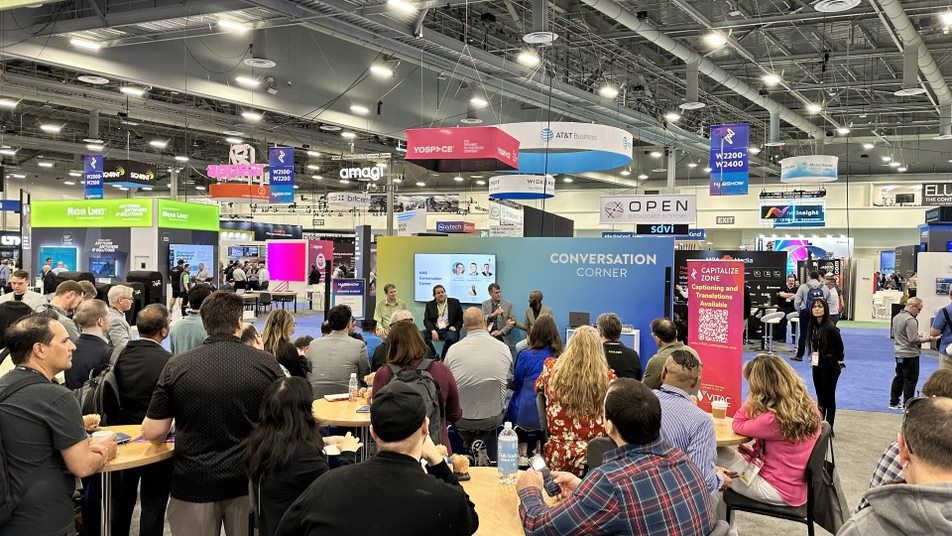Welcome to this month’s edition of “ADA in the News,” featuring recent news, updates, events, and rulings regarding the Americans with Disabilities Act.
Festival Sued Over Lack of Interpreters
Two California men are suing the Burning Man Project, which produces the annual Burning Man community and arts festival in Nevada, over the group’s decision to drop interpretive services for deaf and hard-of-hearing (DHOH) festival-goers.
The men, who are deaf, claim Burning Man dropped its sign language interpreters program in 2017, and refused to bring it back for the 2019 event. The suit argues that not providing interpreters for DHOH attendees violates the Americans with Disabilities Act (ADA).
One of the plaintiffs, Melvin Patterson, has attended Burning Man since 2012, and has worked as a “Black Rock Ranger,” a volunteer group that assists festival-goers and provides public safety information. The suit says that without interpreters, Patterson could not communicate with fellow rangers.
The suit asks for ASL interpreters to be provided at the festival and for Burning Man to “implement policies and procedures that will ensure effective communication, full and equal enjoyment, and a meaningful opportunity to participate in and benefit from [Burning Man] services” for all attendees.
Medical Centers Sued Over Access
The U.S. Equal Employment Opportunity Commission (EEOC) has filed suit against Christus St. Vincent Regional Medical Center in Santa Fe, NM, over alleged ADA violations including harassment and retaliation against a laboratory technician who is deaf.
According to the lawsuit, the technician’s supervisor harassed her during training by repeatedly yelling at her, “I’ve already told you how to do that once.” The suit says that rather than addressing the technician’s training requests, Christus St. Vincent fired her because of her disability and her requests for accommodation.
Such alleged conduct violates the Americans with Disabilities Act, which prohibits discrimination based on disability, as well as retaliation for reporting discriminatory workplace conduct. The ADA requires employers to attempt to provide reasonable accommodations for employees with disabilities.
The lawsuit seeks back pay, compensatory damages, and punitive damages as well as policies to prevent discriminatory practices in the future.
In New York, a federal appeals court reversed a lower court ruling over a claim that a Buffalo hospital failed to provide proper communication access to a patient who is deaf.
The 2nd U.S. Circuit Court of Appeals in New York ruled that Buffalo Medical Center violated the federal Rehabilitation Act of 1973 by failing to provide an American Sign Language interpreter to a patient.
According to court documents, the patient was treated at the medical center in 2014, during which time she unsuccessfully requested an ASL interpreter from hospital staff during her nearly week-long stay. The hospital, according to the court ruling, had an “interpreter policy” that said patients had the right to free deaf and hard-of-hearing services.
The Rehabilitation Act prohibits programs or activities receiving federal funds from excluding or discriminating against persons based on a disability, according to the ruling.
RV Company Refused to Hire Deaf Applicant
Carefree of Colorado, which manufactures and sells RV awnings, violated federal law when it refused to hire a candidate because of her disability, according to a recent EEOC suit.
The suit claims that Carefree refused to hire the woman, who is deaf, for two open positions. The woman had previous manufacturing experience and was qualified for both positions.
The company refused to hire her after expressing concerns her disability could be a “challenge” and present “safety issues.” Carefree also told a job developer representing the woman that she could not work for the company because she is deaf.
The suit says the company also refused to consider the applicant for future employment because she and the job developer complained about discrimination and requested an accommodation.
Such alleged conduct violates the Americans with Disabilities Act, which prohibits employers from making hiring decisions based on disability and from retaliating against individuals who request accommodation or oppose disability-based discrimination.
The lawsuit seeks monetary damages as well as an order prohibiting the company from discriminating against individuals with disabilities.
Candidate Website Accessibility (Update)
Though several candidates in the race for the 2020 Presidential election have worked to improve their websites’ accessibility, none have adopted all of the accessibility standards suggested by a Florida advocacy group.
In June, the Miami Lighthouse for the Blind and Visually Impaired reviewed the websites of Democratic presidential candidates as well as that of President Donald Trump and found none to be fully accessible to voters with disabilities.
“Since that first debate, we have continued to follow the progress of the presidential candidates to make their websites more accessible,” Miami Lighthouse said in its report. “Since our first report, still none of the websites are fully compliant with the ADA, but most of the candidates’ websites showed improvements in accessibility.”
The organization’s newest report says that the websites of candidates Andrew Yang, Joe Biden, Cory Booker, Elizabeth Warren, and Pete Buttigieg have increased their accessibility scores.
Miami Lighthouse for the Blind and Visually Impaired is Florida’s largest and oldest organization serving the needs of blind and low-vision individuals.
Sanctions Against Serial ADA Lawsuit-Filer
Federal Judge Paul Huck late last month imposed sanctions on a Miami lawyer who had filed more than 600 ADA suits across Florida.
The United States District Court for the Southern District of Florida ruled that lawyer Scott Dinin and his client, Alexander Johnson, who is deaf, entered into a scheme that “sought only to improperly profit from ill-gotten attorney’s fees obtained by abusing the ADA.
“Johnson and Dinin did so knowingly and continuously file objectively frivolous claims, inflating their claims for attorney’s fees, then sharing those attorney’s fees, and misrepresenting material facts to the court, all without regard for the interests of the hearing-impaired community whom they profess to benefit.”
Dinin and his client have filed more than 130 lawsuits in the federal court’s Southern District, including, recently, suing a South Florida gas station for failure to provide closed captioning on the TV screens embedded in gas pumps.
“Johnson and Dinin have failed to uphold the laudable goals of the ADA and, instead, have used the ADA as a guise for their enterprise with the hidden agenda of sharing unjustified attorney’s fees.”
The court action forces Dinin to pay back tens of thousands of dollars in settlements. It also reports him to the Florida Bar for attorney conduct review. The court also ordered Johnson to pay back the attorney fees he illegally split with Dinin, which represent more than $84,000 since 2016.
Dinin also represented a Daytona Beach resident who is blind in more than 130 lawsuits across Central Florida. Those suits included website accessibility claims against a number of Florida cities and counties and several businesses.
The suits had forced some cities and government bodies to remove information and documents from their websites in a preemptive measure to avoid a lawsuit.




